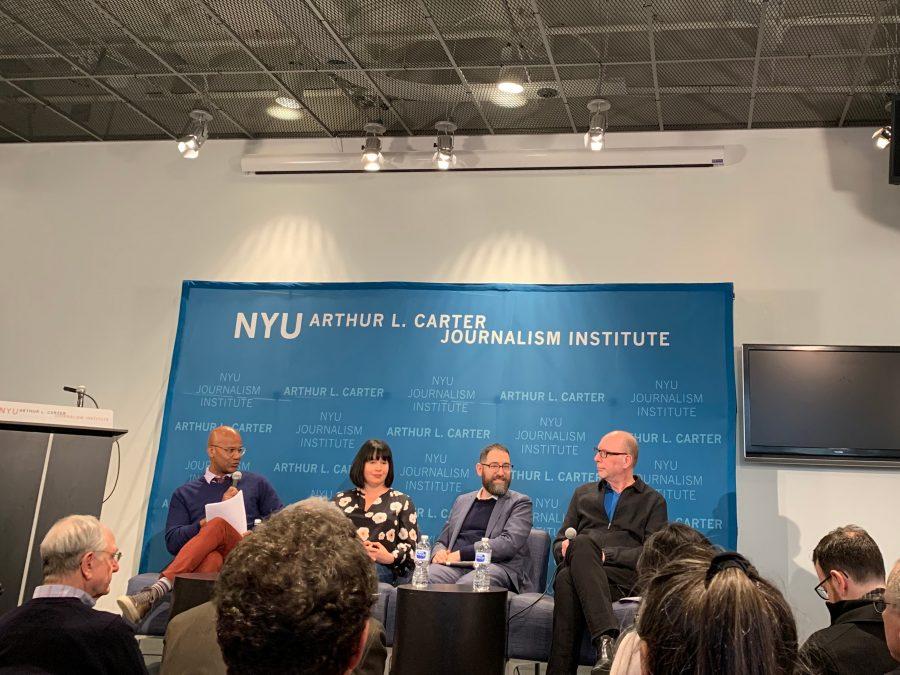During the 2016 presidential election, fake news spread far and wide through social media, and has continued to do so since then. Journalists and academics discussed the rise of fake news in an event at the Arthur L. Carter Journalism Institute on Wednesday.
The New York Times columnist Michelle Goldberg, historian and journalist Rick Perlstein and NYU Associate Journalism Professor Jay Rosen spoke at the event. The Nation columnist Kai Wright moderated the event.
Rosen discussed Facebook’s initiative in December 2016 to outsource fact-checking to third-party organizations to monitor its news content. According to Rosen, Facebook consulted him on the idea. Rosen warned them of the backlash it could face from right-wing media because the fact-checkers being used — Snopes, ABC News and FactCheck.org — are considered to be left-leaning. Facebook then told Rosen that the outlets chosen were not out of political bias.
“It doesn’t matter if you’re trying to be political, these actors are going to denounce you,” Rosen said. “Claiming to be victims of media bias is how they do politics. It doesn’t matter.”
Shortly after Facebook’s announcement, right-wing outlets like Breitbart denounced Facebook and claimed the company had political motivations.
The social media giant then tried to find fact-checkers that were considered to be a part of conservative media, and eventually enlisted the right-leaning outlet The Weekly Standard, which some criticized as a means to appease users who identify as right-leaning.
“They care a lot about appeasing the right,” Goldberg said. “Facebook has an institutional reason to want to avoid this kind of scrutiny because they’re getting a little hammered by the other side, but the left doesn’t have the same power to regulate them. Who they feel themselves accountable to has, to a certain extent, become who could actually do something to them.”
Goldberg said local news outlets were able to build trust in the media, and their disappearance has caused a lack of trust in mainstream media.
“Local news was, for a lot of people, an inherent reality check,” Goldberg said. “You can’t make up if someone is actually fixing the roads in your town. You have this connection to the reporting that fosters a degree of trust that appears in the national and international reporting that appears in those papers.”
Rosen criticized the practice of trying to accommodate all sides of a story as a means to cover a story quickly without bothering to understand what is actually happening. Rosen called this habit “he said, she said journalism” and said it was a common practice to avoid criticism and make deadlines.
“It makes the story possible on deadline,” Rosen said. “It wards off criticism coming to you, it’s something you can to politically motivated denouncers of your journalism. You can say, ‘Hey your view is in there, and your view is in there, so what is the problem?’”
The panelists also discussed how the advent of fake news is not new. Perlstein brought up the example of Ronald Reagan’s campaign pushing disinformation about his opponent, Jimmy Carter, in the 1980 presidential election. According to Perlstein, Reagan’s campaign claimed that Carter would be willing to do anything to get elected, which included compromising U.S. security to get the hostages released in Iran. Perlstein said the media also reported on this disinformation and depicted Carter as critical of Reagan.
Perlstein used this example to criticize the practice of this type of journalism.
“It was within the structure of how daily journalists did their work that made this possible,” Perlstein said. “It was weaponized by the Republican side and it blindsided the Democratic side.”
Heading into the 2020 presidential election, the panelists were not optimistic about the prospect of fake news subsiding, and anticipated the issue to worsen during the election season.
“I think it’s going to be a culture war from beginning to end,” Rosen said. “I don’t think truth is going to play much of a role at all. Most of the people who are responsible for reporting the 2020 [election] are going into it with the same tools they used for the 2016 election.”
Email Meghna Maharishi at [email protected].


























































































































































